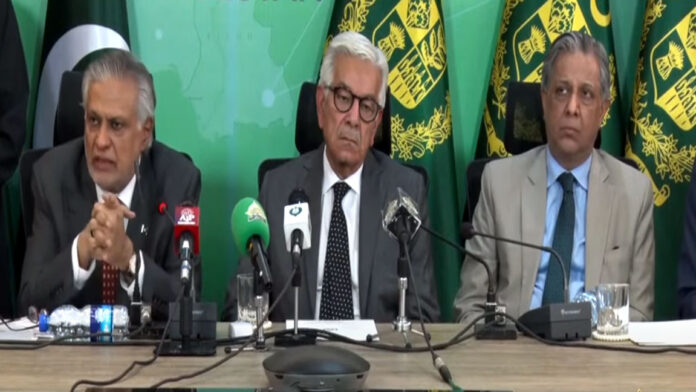- Advertisement -
ISLAMABAD, Apr 24 (APP):Deputy Prime Minister and Foreign Minister (DPM/FM) Senator Mohammad Ishaq Dar on Thursday said that Pakistan was committed to peace and stability in the region and was fully prepared to defend its sovereignty.
The deputy prime minister, addressing a press conference accompanied by Minister for Defence Khawaja Muhammad Asif, Minister for Law and Justice, Senator Azam Nazeer Tarar, Minister for Information and Broadcasting, Attaullah Tarar and Attorney General, Mansoor Usman Awan, said that Pakistan was not looking for conflict, but any aggression would be met with decisive and reciprocal measures.
The ministers announced a series of countermeasures against India in the aftermath of a National Security Committee (NSC) meeting chaired by Prime Minister Shehbaz Sharif and attended by top civil and military leadership.
DPM Ishaq Dar warned that any attempt to stop or divert Pakistan’s rightful share of water would be met with full force.
He added that Pakistan vehemently rejected the Indian announcement to hold the Indus Waters Treaty in abeyance and termed it tantamount to act of war.
The Indus Waters Treaty, brokered by the World Bank in 1960, he said was regarded as a rare example of peaceful cooperation between the two countries.
Dar emphasized that the treaty does not contain any clause allowing unilateral suspension, calling India’s move a “gross violation of international law.”
The DPM while reading out Pakistan’s retaliatory measures mentioned that the Attari-Wagah border was shut down with immediate effect along with all cross-border transit suspended, and individuals with valid endorsements until April 30 to return.
He added that all visas issued under the SAARC Visa Exemption Scheme to Indian nationals were cancelled, except for Sikh religious pilgrims, who may remain in Pakistan temporarily.
“Pakistan has declared Indian Defence, Naval, and Air Advisors posted in Islamabad persona non grata. These officials must leave the country by April 30. The strength of the Indian High Commission in Islamabad will be reduced to 30 diplomats and staff,” he said.
In a major move, he said Pakistan had closed its airspace to all Indian-owned or Indian-operated airlines, whereas all trade with India, including third-country transits through Pakistan, was suspended.
“India has a long history of using false flags and blame games to justify aggressive policies,” Dar said, asserting that Pakistan possesses credible evidence of foreigners entering Indian-held Kashmir, allegedly with the support of Indian intelligence agencies.
He said Pakistan’s Ministry of Foreign Affairs had issued a formal statement on the Pahalgam incident before India’s evening press briefing, expressing concern over the attack, he added.
Dar warned that unilateral Indian actions may prompt Pakistan to suspend other bilateral agreements, including the historic Simla Agreement.
Highlighting Pakistan’s growing global diplomatic role, Dar noted the country’s recent election to the UN Security Council for the 2025–2026 term with an unprecedented 182-vote majority.
He added that Pakistan would assume the rotating presidency of the UNSC in July 2025, and will use its platform to advocate for regional peace and justice.
He further stated that Pakistan has briefed friendly countries and UNSC permanent members on the situation and has proposed two amendments to a draft UNSC resolution concerning regional security and terrorism.
Dar emphasized Pakistan’s belief in multilateralism, diplomacy, and international law, while reaffirming that the government would continue to inform its people and global partners of future developments.

